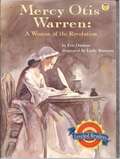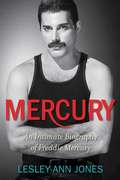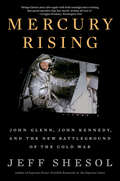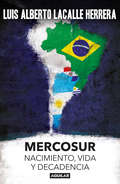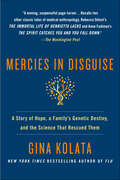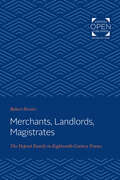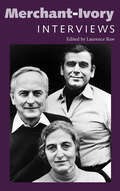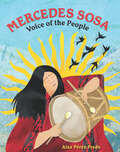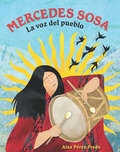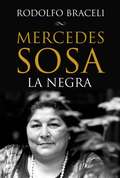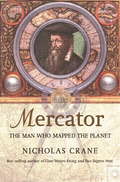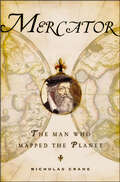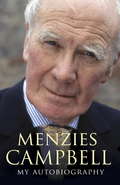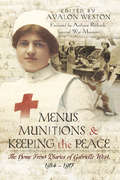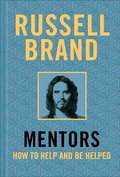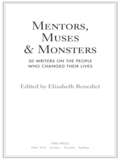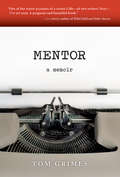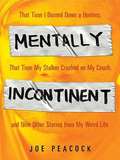- Table View
- List View
Mercy Otis Warren: A Woman of the Revolution
by Eric OatmanFifth grade reading series. A book about Mercy Otis Warren.
Mercury: An Intimate Biography of Freddie Mercury
by Lesley-Ann JonesA REVEALING, INTIMATE LOOK AT THE MAN WHO WOULD BE QUEEN As lead vocalist for the iconic rock band Queen, Freddie Mercury's unmatched skills as a songwriter and his flamboyant showmanship made him a superstar and Queen a household name. But despite his worldwide fame, few people ever really glimpsed the man behind the glittering façade. Now, more than twenty years after his death, those closest to Mercury are finally opening up about this pivotal figure in rock 'n' roll. Based on more than a hundred interviews with key figures in his life, Mercury offers the definitive account of one man's legendary life in the spotlight and behind the scenes. Rock journalist Lesley-Ann Jones gained unprecedented access to Mercury's tribe, and she details Queen's slow but steady rise to fame and Mercury's descent into dangerous, pleasure-seeking excesses-- this was, after all, a man who once declared, "Darling, I'm doing everything with everyone." In her journey to understand Mercury, Jones traveled to London, Zanzibar, and India--talking with everyone from Mercury's closest friends to the sound engineer at Band Aid (who was responsible for making Queen even louder than the other bands) to second cousins halfway around the world. In the process, an intimate and complicated portrait emerges. Meticulously researched, sympathetic yet not sensational, Mercury offers an unvarnished look at the extreme highs and lows of life in the fast lane. At the heart of this story is a man . . . and the music he loved.
Mercury Rising: John Glenn, John Kennedy, And The New Battleground Of The Cold War
by Jeff ShesolOne of the Washington Post's 20 Books to Read This Summer A riveting history of the epic orbital flight that put America back into the space race. If the United States couldn’t catch up to the Soviets in space, how could it compete with them on Earth? That was the question facing John F. Kennedy at the height of the Cold War—a perilous time when the Soviet Union built the wall in Berlin, tested nuclear bombs more destructive than any in history, and beat the United States to every major milestone in space. The race to the heavens seemed a race for survival—and America was losing. On February 20, 1962, when John Glenn blasted into orbit aboard Friendship 7, his mission was not only to circle the planet; it was to calm the fears of the free world and renew America’s sense of self-belief. Mercury Rising re-creates the tension and excitement of a flight that shifted the momentum of the space race and put the United States on the path to the moon. Drawing on new archival sources, personal interviews, and previously unpublished notes by Glenn himself, Mercury Rising reveals how the astronaut’s heroics lifted the nation’s hopes in what Kennedy called the "hour of maximum danger."
Mercs True Stories of Mercenaries in Action
by Bill FawcettRanging from ancient times to the Vietnam War to the drug wars of modern-day Central and South America, this collection of true-life accounts chronicles the experiences and exploits of professional soldiers of fortune.
Mercosur: Nacimiento, vida y decadencia
by Luis Alberto Lacalle- El Mercosur ha sido, desde sus inicios, objeto de múltiples debates y confrontaciones. ¿Se trata de una herramienta útil? ¿Aporta al desarrollo de los países que lo integran, o limita sus posibilidades de vincularse con el resto del mundo? ¿Debe tener una orientación económica o política? ¿Cómo se resuelven las asimetrías entre los países grandes y los pequeños? El Dr. Luis Alberto Lacalle Herrera, protagonista del proceso gestacional del Mercosur y sus primeros años de desarrollo, aporta su mirada lúcida e incisiva a este debate de profunda vigencia e importancia. Con una prosa que discurre con agilidad, y que no rehúye al compromiso con las propias convicciones y a la mención de los momentos difíciles del proceso, estas páginas se convierten en un aporte para comprender los procesos internos que marcaron la historia de este proyecto de integración regional. Este libro es un aporte fundamental para comprender los vaivenes que han atravesado los países en torno al Mercosur, y su reflexión se orienta hacia el desarrollo de la región, de cara al futuro.
Mercies in Disguise: A Story of Hope, a Family's Genetic Destiny, and the Science That Rescued Them
by Gina Kolata"[Kolata] is a gifted storyteller. Her account of the Baxleys... is both engrossing and distressing... Kolata's book raises crucial questions about knowledge that can be both vital and fatal, both pallative and dangerous." —Andrew Solomon, The New York Review of BooksNew York Times science reporter Gina Kolata follows a family through genetic illness and one courageous daughter who decides her fate shall no longer be decided by a genetic flaw.The phone rings. The doctor from California is on the line. “Are you ready Amanda?” The two people Amanda Baxley loves the most had begged her not to be tested—at least, not now. But she had to find out.If your family carried a mutated gene that foretold a brutal illness and you were offered the chance to find out if you’d inherited it, would you do it? Would you walk toward the problem, bravely accepting whatever answer came your way? Or would you avoid the potential bad news as long as possible? In Mercies in Disguise, acclaimed New York Times science reporter and bestselling author Gina Kolata tells the story of the Baxleys, an almost archetypal family in a small town in South Carolina. A proud and determined clan, many of them doctors, they are struck one by one with an inscrutable illness. They finally discover the cause of the disease after a remarkable sequence of events that many saw as providential. Meanwhile, science, progressing for a half a century along a parallel track, had handed the Baxleys a resolution—not a cure, but a blood test that would reveal who had the gene for the disease and who did not. And science would offer another dilemma—fertility specialists had created a way to spare the children through an expensive process. A work of narrative nonfiction, Mercies in Disguise is the story of a family that took matters into its own hands when the medical world abandoned them. It’s a story of a family that had to deal with unspeakable tragedy and yet did not allow it to tear them apart. And it is the story of a young woman—Amanda Baxley—who faced the future head on, determined to find a way to disrupt her family’s destiny.
Merchants, Landlords, Magistrates: The Depont Family in Eighteenth-Century France
by Robert ForsterOriginally published in 1980. A social historian of modern France, Robert Forster discovered a series of father-to-son letters that presented an unusual opportunity to trace in human terms the impact of institutions and cultural norms on eighteenth-century French society. From these letters and other family papers, Forster reconstructed a family biography of the Deponts of La Rochelle over four generations. Their story affords new insights into the workings of institutions—economic, religious, legal, administrative—the mentality of provincial notables, the world of Parisian high finance and salon society, and the response of a socially mobile family to the challenges of the century, climaxing in the French Revolution of 1789. Forster demonstrates how real people in an upwardly mobile family coped with their changing society, moved from overseas trade to local and then national office, managed their wealth, treated their children, and then parried the psychological shocks accompanying their ascent to status and power. It is the story not of a "class" response to abstract trends or forces identified by the historian in retrospect but of flesh-and-blood human beings grappling with day-to-day decisions and revealing a full range of human ambiguity and inconsistency. This study offers perspective on the emergence by 1800 of a new elite in France—a social amalgam of landlords, administrators, and professional men, inculcated with a national awareness and a cautious political liberalism. These were the notables who would govern France in the next century. Forster's approach, uncommon among social historians, combines narrative and analytical modes of historiography. Based on archival materials in La Rochelle and Paris, the book blends economic, social, cultural, and political history.
Merchant-Ivory: Interviews (Conversations with Filmmakers Series)
by Laurence RawMerchant-Ivory: Interviews gathers together, for the first time, interviews made over a span of fifty years with director James Ivory (b. 1928), producer Ismail Merchant (1936–2005), and screenwriter Ruth Prawer Jhabvala (1927–2013). Beginning with their earliest work in India, and ending with James Ivory's last film, The City of Your Final Destination (2009), the book traces their career, while offering valuable insights into their creative filmmaking process. The volume serves as a corrective to the prevailing critical orthodoxy attached to Merchant-Ivory's work, which tends to regard them as being solely concerned with historically accurate costumes and settings. As independent filmmakers, they have developed an idiosyncratic approach that resists facile classification. Merchant-Ivory have insisted on maintaining their independence. More importantly, this book shows how Merchant-Ivory have always taken considerable care in casting their films, as well as treating actors with respect. This is a deliberate policy, designed to bring out one of the triumvirate's principal thematic concerns, running throughout their work—the impact of the “clash of cultures” on individuals. Partly this has been inspired by their collective experiences of living and working in different cultures. They do not offer any answers to this issue; rather they believe that their task is simply to raise awareness; to make filmgoers conscious of the importance of cultural sensitivities that assume paramount significance in any exchange, whether verbal or nonverbal.
Mercedes Sosa: Voice of the People
by Aixa Pérez-PradoA stirring picture book biography of one of Latin America's most beloved singers and human rights advocates, Mercedes Sosa.Have you ever heard a song that made your heart soar? A canción that captured your corazón? A voice so powerful that it made you feel ready to change the world? This is the story of a singer whose voice sailed through the air like the wings of a condor, inspiring people everywhere. Written and illustrated by Aixa Pérez-Prado, this is the powerful biography of Argentinean folksinger and human rights advocate Mercedes Sosa. Affectionately known as La Negra, Mercedes used her musical talents and powerful voice to speak out against poverty and inequality in her home country. In the face of a cruel dictatorship, Mercedes refused to be silenced. She bravely stepped on stage to lend a "voice to the voiceless" with uplifting songs of empathy and empowerment. Her unforgettable music and messages of hope continue to resonate with people across the world to this day.
Mercedes Sosa: La voz del pueblo
by Aixa Pérez-PradoUna conmovedora biografía ilustrada de una de las cantantes y defensoras de derechos humanos más queridas de América Latina, Mercedes Sosa. A stirring picture book biography of one of Latin America's most beloved singers and human rights advocates, Mercedes Sosa.¿Alguna vez has oído una canción que te elevó a lo más alto? ¿Una canción que capturó tu corazón? ¿Una voz tan poderosa que te hizo sentir listo para cambiar el mundo? Esta es la historia de una cantora cuya voz navegó por el aire como las alas de un cóndor, inspirando al pueblo en cada latido de la tierra. Escrita e ilustrada por Aixa Pérez-Prado, esta es la conmovedora historia de la cantante folklórica y defensora de derechos humanos argentina Mercedes Sosa. Conocida cariñosamente como la Negra, Mercedes utilizó su talento musical y su poderosa voz para denunciar la pobreza y la desigualdad en su país. Ante una cruel dictadura, Mercedes se negó a ser silenciada. Con valentía subió al escenario para "dar voz a los que no tienen voz" con canciones edificantes de empatía y empoderamiento. Su música inolvidable y sus mensajes de esperanza continúan resonando en personas de todo el mundo hasta el día de hoy. Written and illustrated by Aixa Pérez-Prado, this is the powerful biography of Argentinean folksinger and human rights advocate Mercedes Sosa. Affectionately known as La Negra, Mercedes used her musical talents and powerful voice to speak out against poverty and inequality in her home country. In the face of a cruel dictatorship, Mercedes refused to be silenced. She bravely stepped on stage to lend a "voice to the voiceless" with uplifting songs of empathy and empowerment. Her unforgettable music and messages of hope continue to resonate with people across the world to this day.
Mercedes Sosa, la Negra
by Rodolfo Braceli"Mercedes Sosa no quiso hacer como que escribía sus memorias valiéndose de un escritor fantasma. No quiso mandarse la parte ni simular. Ésta es una biografía escrita en voz alta. Había que contar esa trayectoria, más el trasfondo de una vida personal que nació en la ardua pobreza acechada por el hambre, y que después estuvo enmarcada por el compromiso ideológico, las amenazas de muerte, el exilio. La paradoja de esta vida es que, a más desgarramiento y dolor en lo personal y afectivo, más éxito, más ovaciones en lo artístico, más fama. Me enfrenté con el problema de la abundancia, que a veces no es menos terrible que el de la escasez. Tuve que resolver cómo contar la prodigiosa vida de esta mujer que es (con Carlos Gardel), sin discusión, la cantante popular de mayor prestigio y proyección mundial que produjo la Argentina."
Mercedes Sosa, La Negra (Edición definitiva)
by Rodolfo BraceliLa negra Mercedes Sosa canta su biografía. A los 67, en el 2003, decidiócontar su vida. Como no quiso simularse escritora, la suya es unabiografía en voz alta. «Mercedes Sosa. La Negra» es la edición definitiva de la única biografíaque se realizó con su palabra viva. Es así como, para un personajecomplejo y atípico, Rodolfo Braceli eligió un camino inusual. Todo subagaje de escritor, periodista, dramaturgo y poeta lo despliega en esteoriginal libro desde y sobre Mercedes Sosa. Por un lado, el relato de lasuprema cantante-cantora es la columna vertebral. Por otro, emergenvoces: la de su madre y hermanos, la de su hijo y amigos.Cada tanto aparecen, con sus recuerdos, figuras como León Gieco, HoracioMolina, Víctor Heredia, Liliana Herrero, Carlos Alonso y Charly García.Ellos completan el retrato de la otra Mercedes, la que estaba lejos delas ovaciones y muy cerca de la gente.No es todo: a la voz, por momentos en carne viva de la protagonista, sesuma en el montaje el relato de episodios dramáticos y memorables quemarcaron su vida y su carrera. Este libro que empezó a gestarse hacecasi medio siglo incluye infancia, adolescencia, despertar artístico,amores y desamores, ideología, amenazas de muerte, censura y exilio,glorioso retorno en el 82, consagración mundial, enfermedad conapetencia de suicidio en el 97, testamento. Como escribió LilianaHerrero: «Estamos ante una confesión pasional, pero también ante undocumento extraordinario. Ante un libro político y también profundamenteíntimo, público y privado, indispensable para contar la historiacultural de este país».
Mercator: The Man who Mapped the Planet
by Nicholas CraneA biography of the genius who mapped the world and for ever changed the face of the planet - by a bestselling author.Gerard Mercator (1512-1594) was born at the dawn of the Age of Discovery, when the world was beginning to be discovered and carved up by navigators, geographers and cartographers. Mercator was the greatest and most ingenious cartographer of them all: it was he who coined the word 'atlas' and solved the riddle of converting the three-dimensional globe into a two-dimensional map while retaining true compass bearings. It is Mercator's Projection that NASA are using today to map Mars. How did Mercator reconcile his religious beliefs with a science that would make Christian maps obsolete? How did a man whose imagination roamed continents endure imprisonment by the Inquisition? Crane brings this great man vividly to life, underlying it with colour illustrations of the maps themselves: maps that brought to a rapt public wonders as remarkable as today's cyber-world.
Mercator: The Man who Mapped the Planet
by Nicholas CraneA biography of the genius who mapped the world and for ever changed the face of the planet - by a bestselling author.Gerard Mercator (1512-1594) was born at the dawn of the Age of Discovery, when the world was beginning to be discovered and carved up by navigators, geographers and cartographers. Mercator was the greatest and most ingenious cartographer of them all: it was he who coined the word 'atlas' and solved the riddle of converting the three-dimensional globe into a two-dimensional map while retaining true compass bearings. It is Mercator's Projection that NASA are using today to map Mars. How did Mercator reconcile his religious beliefs with a science that would make Christian maps obsolete? How did a man whose imagination roamed continents endure imprisonment by the Inquisition? Crane brings this great man vividly to life, underlying it with colour illustrations of the maps themselves: maps that brought to a rapt public wonders as remarkable as today's cyber-world.
Mercator: The Man Who Mapped the Planet
by Nicholas CraneAn enthralling biography of the man who created the first real map of the world and changed civilizationBorn at the dawn of the age of discovery, Gerhard Mercator lived in an era of formidable intellectual and scientific advances. At the center of these developments were the cartographers who painstakingly pieced together the evidence to create ever more accurate pictures of the planet. Mercator was the greatest of all of them-a poor farm boy who attended one of Europe's top universities, was persecuted and imprisoned by the Inquisition, but survived to coin the term "atlas" and to produce the so-called projection for which he is known. Devoutly religious, yet gripped by Aristotelian science, Mercator struggled to reconcile the two, a conflict mirrored by the growing clash in Europe between humanism and the Church.Mercator solved the dimensional riddle that had vexed cosmographers for so long: How could the three-dimensional globe be converted into a two-dimensional map while retaining true compass bearings? The projection revolutionized navigation and has become the most common worldview.Nicholas Crane-a fellow geographer-has combined a keen eye for historical detail with a gift for vivid storytelling to produce a masterful biography of the man who mapped the planet.
Menzies Campbell: My Autobiography
by Menzies CampbellMenzies (Ming) Campbell is one of the few politicians in Britain who is universally admired and respected by people of all parties and by the voting public.Born into an ordinary Glasgow family, Ming spent much of his youth striving to become an international athlete. He describes vividly what it was like to take part in both the Olympics and the Commonwealth Games while still relatively inexperienced. Such was his ability that he held the UK 100 metres record from 1967 to 1974. His interest in politics deepened after he began his successful legal career and he became an MP at the age of 46. His outspoken but statesmanlike views on the conduct of British foreign policy made him well known as a parliamentary performer, particularly during the controversial invasion of Iraq. Even his struggle to overcome cancer, movingly described in this book for the first time, didn't prevent him performing his duties as Deputy Leader to great acclaim. His characteristically candid look behind the scenes of the politics and personalities of the past twenty years is of great interest.This is a memoir to be enjoyed for its honesty, warmth and wit as well as its insights. It's the story of one man's efforts to succeed in a world where the qualities he embodies are rarely apparent - and seldom valued.
Menus, Munitions and Keeping the Peace: The Home Front Diaries of Gabrielle West 1914–1917
by Avalon WestonWhen Gabrielle West wrote diaries about her war to send to her much missed favorite brother in India she had no idea that a hundred years later they would be of interest to anyone.Soon after the outbreak of the First World War, Vicars daughter Gabrielle joined the Red Cross and worked as a volunteer cook in two army convalescent hospitals. She then secured paid positions in the canteens of the Farnborough Royal Aircraft Factory and then the Woolwich Arsenal, where she watched Zeppelin raids over London during her night shifts. Having failed a mental arithmetic test to drive a horse-drawn bread van for J. Lyons, she was among the first women enrolled in the police and spent the rest of the war looking after the girls in various munitions factories.Gabrielle wrote about and drew what she saw. She had no interest in opinion or politics. She took her bicycle and her dog Rip everywhere and they appear in many of her stories. She had a sharp eye and sometimes a sharp pen.At the end of the war she was simply sent home. She spent the rest of her life caring for relatives. She lived to 100 and never married. The First World War was her big adventure.These days, the reader might feel MI5 should worry about those detailed line drawings of the processes in the factories being sent by Royal Mail across the world but a hundred years ago?
Mentre Stiro
by Valerie Hockert Nicole StellaCos'è successo ai vestiti antipiega? Tina si chiede mentre stira un paio di pantaloni a pinocchietto, con non poca fatica. Ripercorre la storia dei tessuti, dal perma press, ai vestiti senza pieghe, alle fibre naturali, fino a quelli che ancora oggi devono essere stirati, proprio quando la vita dovrebbe essere più semplice. Mentre Tina sta stirando la camicia del marito, si chiede perchè lui sia così ostinato ad indossare completi eleganti, con giacca e cravatta, nel suo lavoro da stock broker. Riflette anche su che tipo curato sia, e come ogni cosa debba essere in ordine. Se qualcosa è fuori posto, lui impazzisce. Parlando di impazzire... Mentre Tina stira un vestito che ha indossato ad una festa a cui ha partecipato con il marito, riflette sui bei momenti che erano soliti passare insieme e si chiede che cosa sia accaduto tra loro.
Mentors: How to Help and Be Helped
by Russell BrandRussell Brand explores the idea of mentoring and shares what he's learned from the guidance of his own helpers, heroes and mentors.Could happiness lie in helping others and being open to accepting help yourself? Mentors – the follow up to the New York Times bestseller Recovery – describes the benefits of seeking and offering help."I have mentors in every area of my life, as a comic, a dad, a recovering drug addict, a spiritual being and as a man who believes that we, as individuals and the great globe itself, are works in progress and that through a chain of mentorship we can improve individually and globally, together . . . One of the unexpected advantages my drug addiction granted is that the process of recovery that I practise includes a mentorship tradition. "I will encourage you to find mentors of your own and explain how you may better use the ones you already have. Furthermore, I will tell you about my experiences mentoring others and how invaluable that has been on my ongoing journey to self-acceptance and how it has helped me to transform from a bewildered and volatile vagabond to a (mostly) present and (usually) focussed husband and father."—Russell Brand Mentors: How to Help and Be Helped describes the impact that a series of significant people have had on the author – from the wayward youths he tried to emulate growing up in Essex, through the first ex-junkie sage, to the people he turns to today to help him be a better father. It explores how we all – consciously and unconsciously – choose guides, mentors and heroes throughout our lives and examines the new perspectives they can bring.
Mentors, Muses & Monsters
by Elizabeth BenedictFor Denis Johnson, it was Leonard Gardner's cult favorite Fat City; for Jonathan Safran Foer, it was a brief encounter with Israeli poet Yehuda Amichai; Mary Gordon's mentors were two Barnard professors, writers Elizabeth Hardwick and Janice Thaddeus, whose lessons could not have been more different. In Mentors, Muses & Monsters, edited and with a contribution by Elizabeth Benedict, author of the National Book Award finalist Slow Dancing, thirty of today's brightest literary lights turn their attention to the question of mentorship and influence, exploring the people, events, and books that have transformed their lives. The result is an astonishing collection of stirring, insightful, and sometimes funny personal essays. In her communications with contributors, Benedict noticed a longing to thank the people who had changed their lives, and to acknowledge them the best way a storyteller can, by revealing the intricacies of their connection. These writers look back to when something powerful happened to them at an unpredictable age, a moment when a role model saw potential in them, or when they came to understand they possessed literary talent themselves. As most of these encounters occurred when the writers were young -- unsure of who they were or what they could accomplish -- several pieces radiate a poignant tenderness, and almost all of them express enduring gratitude. When Joyce Carol Oates describes her public-rivalry-turned-wary-professional-acquaintanceship with Donald Barthelme, we are privy to the fascinating sight of one of today's most important writers being directly, personally affected by another influential writer. When Sigrid Nunez reveals what it was like to be Susan Sontag's protégé, we get a glimpse into the private life and working philosophy of a formidable public intellectual. And when Jane Smiley describes her first year at the Iowa Writers' Workshop in 1974, she offers an intimate portrait of a literary milieu of enduring significance for American literature. Rich, thought-provoking, and often impassioned, these pieces illuminate not only the anxiety but the necessity of influence -- and also the treasures it yields. By revealing themselves as young men and women in search of direction and meaning, these artists explore the endlessly varied paths to creative awakening and literary acclaim.
Mentor: A Memoir
by Tom GrimesAn intimate look at the writing life, the famed Iowa Writers' Workshop, the fickle publishing world, and an extraordinary friendship with Frank Conroy. A chance encounter between two writers, one young, one older, develops into a wonderful friendship neither expected. Frank Conroy, author of the classic memoir Stop-Time, meets Tom Grimes, an aspiring writer and an applicant to the Iowa Writers' Workshop, which Conroy directs. First as teacher and student--and gradually as friends--their lives become entwined, and through both successes and disappointments, their bond deepens. Exquisitely written, Mentor is an honest and heartbreaking exploration of the writing life and the role of a very important teacher.
Mentor: A Memoir
by Tom GrimesAn intimate look at the writing life, the famed Iowa Writers' Workshop, the fickle publishing world, and an extraordinary friendship with Frank Conroy. A chance encounter between two writers, one young, one older, develops into a wonderful friendship neither expected. Frank Conroy, author of the classic memoir Stop-Time, meets Tom Grimes, an aspiring writer and an applicant to the Iowa Writers' Workshop, which Conroy directs. First as teacher and student--and gradually as friends--their lives become entwined, and through both successes and disappointments, their bond deepens. Exquisitely written, Mentor is an honest and heartbreaking exploration of the writing life and the role of a very important teacher.
Mentor: A Memoir
by Tom GrimesAn intimate look at the writing life, the famed Iowa Writers' Workshop, the fickle publishing world, and an extraordinary friendship with Frank Conroy. A chance encounter between two writers, one young, one older, develops into a wonderful friendship neither expected. Frank Conroy, author of the classic memoir Stop-Time, meets Tom Grimes, an aspiring writer and an applicant to the Iowa Writers' Workshop, which Conroy directs. First as teacher and student--and gradually as friends--their lives become entwined, and through both successes and disappointments, their bond deepens. Exquisitely written, Mentor is an honest and heartbreaking exploration of the writing life and the role of a very important teacher.
Mentor
by Tom GrimesA chance encounter by two writers, one young, one older, develops into a wonderful friendship neither expected. Frank Conroy, the author of the classic memoir Stop-Time, meets Tom Grimes, an aspiring writer and an applicant to the Iowa Writers' Workshop, which Conroy directs. First as teacher and student - and gradually as friends-their lives become entwined, and through both successes and disappointments, their bond deepens. Exquisitely written, Mentor is an honest and heartbreaking exploration of the writing life and the role of a very important teacher.
Mentally Incontinent
by Joe PeacockThe 21 stories in this book were chosen by the more than 500,000 readers of the author's website over the course of three years, thereby producing the world's first Internet-based, reader-edited book.
